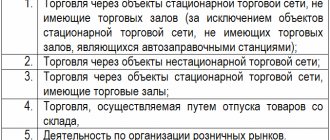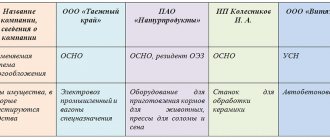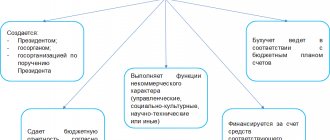Features of income taxation for foreign organizations
Foreign companies, which within the framework of tax legislation are equated to Russian ones, are required to adhere to all the norms of Chapter.
25 of the Tax Code of the Russian Federation (hereinafter referred to as the Tax Code) on the calculation and payment of income tax, like Russian tax payers. Foreign organizations that have income from sources in the Russian Federation and conduct their business activities through permanent representative offices are recognized as tax payers in the Russian Federation (Clause 1, Article 246 of the Tax Code). Moreover, if such companies do not operate through official representative offices in Russia, but have income from sources in the Russian Federation, then they are subject to taxation in accordance with Art. 309 NK.
Since 2015, a new term has appeared in Russian tax legislation - controlled foreign organizations. Changes to codified tax legislation related to the emergence of a new subject of taxation were introduced by the Federal Law “On Amendments to Parts I and II of the Tax Code of the Russian Federation” dated November 24, 2014 No. 376-FZ. The law was adopted as part of the state program for deoffshorization of business. The specifics of taxation of profits of controlled foreign companies are taken into account in Art. 309.1 NK.
ConsultantPlus experts have developed step-by-step instructions on the specifics of taxing the profits of a controlled foreign company:
If you don't have access to the system, get a free trial online.
Taxable income of a foreign organization
For convenience, we have shown them in a table.
| Type of income | Maximum tax rate <*>, % |
| Dividends | 15 |
| Income from the distribution of profits or property of organizations, including upon their liquidation or withdrawal of a participant from the LLC | 20 |
| Interest on debt obligations of any type | 20 |
| Income from the use of rights to intellectual property in the Russian Federation, in particular: - license fees (royalties); — payments under a commercial concession (franchising) agreement | 20 |
| Let us note that, according to the Ministry of Finance, such payments are subject to Russian income tax, even if the very right to use intellectual property will be used outside the Russian Federation. Income from the sale of exclusive rights is not subject to withholding tax | |
| Income from the sale of shares (stakes) of Russian organizations, more than 50% of whose assets consist of real estate located on the territory of the Russian Federation, as well as financial instruments derived from such shares, with the exception of: - shares recognized as trading on the organized securities market in accordance with from paragraph 3 of Art. 280 Tax Code of the Russian Federation; — securities, as well as derivative financial instruments sold on foreign exchanges through foreign trade organizers | 20 |
| Income from the sale of real estate located in the Russian Federation | 20 |
| Income from leasing or subleasing property (except for ships or aircraft, vehicles, as well as containers used in international transportation) used in the territory of the Russian Federation, including income from leasing operations (less the recoverable cost of leased property) | 20 |
| Income from the leasing or subleasing of ships or aircraft, vehicles, as well as containers used in international transport | 10 |
| Income from international transportation if the point of destination or departure is located on the territory of the Russian Federation | 10 |
| Forwarding services do not relate to transportation, therefore income from them is not subject to Russian income tax | |
| Fines and penalties for violation of contractual obligations | 20 |
——————————— <*> International treaties (double taxation agreements) may establish reduced rates of income tax or may generally provide for the exemption of specific income from taxation on the territory of the Russian Federation (Article 7 of the Tax Code of the Russian Federation).
In addition, the Tax Code of the Russian Federation states that “other similar income” is also subject to income tax (Subclause 10, paragraph 1, Article 309 of the Tax Code of the Russian Federation). However, what should be understood by this is not explained in the Code. There are three positions that have emerged in law enforcement practice on this issue. Position 1. This is any income received from sources in the Russian Federation, not related to the activities of a permanent representative office of a foreign organization and not related to income from the sale of property, property rights, performance of work, provision of services on the territory of the Russian Federation (Clause 2 of Article 309 of the Tax Code of the Russian Federation; clause 1.1 of section II of the Methodological recommendations to tax authorities on the application of certain provisions of Chapter 25 of the Tax Code of the Russian Federation concerning the specifics of taxation of profits (income) of foreign organizations, approved by Order of the Ministry of Taxes of Russia dated March 28, 2003 N BG-3-23/150 (hereinafter referred to as Methodological recommendations)). This approach allows regulatory authorities to classify income similar to that listed in paragraph 1 of Art. 309 of the Tax Code of the Russian Federation: - payments of insurance compensation under property insurance contracts (Letters of the Ministry of Finance of Russia dated 08/11/2011 N 03-03-06/3/6, dated 06/25/2010 N 03-03-06/1/431); - income from operations with any financial instruments of forward transactions (Letters of the Ministry of Finance of Russia dated 08/26/2011 N 03-03-06/2/133, dated 07/07/2011 N 03-08-05, dated 03/16/2011 N 03-08-05 ); — bonuses paid to a foreign buyer for the purchase of a certain quantity of goods (Letter of the Ministry of Finance of Russia dated 08/11/2009 N 03-08-05); - income received by a foreigner under a trust management agreement, in which the Russian organization is the trustee, and the foreign organization is the founder or beneficiary (Clause 6 of Article 309 of the Tax Code of the Russian Federation; Letter of the Ministry of Finance of Russia dated October 6, 2009 N 03-03-06/1/ 642). Position 2. This is income not related to the normal business activities of a foreign company (Resolution of the Presidium of the Supreme Arbitration Court of the Russian Federation dated July 8, 2008 N 3770/08). That is, similar income is “passive” income received from capital investments and does not depend on everyday activities. At the same time, in the list of paragraph 1 of Art. 309 of the Tax Code of the Russian Federation mentions such income as income from international transportation, which cannot be called “passive”. Position 3. These are incomes similar to those directly named in paragraph 1 of Art. 309 of the Tax Code of the Russian Federation (Letter of the Department of Tax Administration of Russia for Moscow dated 06/05/2002 N 26-12/25907; Resolution of the Federal Antimonopoly Service of the Moscow Region dated 02/01/2006, 01/25/2006 N KA-A41/12791-05). For example, interest on the use of other people's money under Art. 395 of the Civil Code of the Russian Federation are similar to fines and penalties for violation of contractual obligations. As you can see, there are several options. But in any case, if you doubt whether the income that you will pay to a foreign counterparty belongs to income taxed at the source of payment (tax agent), look also at clause 2 of Art. 309 of the Tax Code of the Russian Federation, which names the income of foreigners from whom Russian organizations do not withhold tax.
Withholding tax from the income of a company registered abroad
Income of foreign companies from sources in Russia that do not operate through permanent representative offices in the Russian Federation is determined in accordance with Art. 309 NK. Profit tax on such income is withheld by the Russian company, which pays the income received by the counterparty (clause 1 of Article 310 of the Tax Code).
In this case, it is important whether an international tax treaty has been concluded between the Russian Federation and the country where this foreign company is registered. A reference to the priority of the norms of an international agreement is contained in Art. 7 NK.
In order for the tax agent to apply special rules in accordance with the international treaty concluded by the Russian Federation to avoid double taxation, a company registered abroad must provide him with information about the place of its registration, translated into Russian. All such special rules are prescribed in Art. 312 NK.
Tax agent
Income tax on the income of a foreign organization is calculated, withheld and transferred to the budget system of the Russian Federation by the tax agent at special rates (depending on the type of income). The tax agent “connects” if the income is paid (clause 4 of article 286, clause 1, 1.1 of article 309 of the Tax Code of the Russian Federation):
- a foreign organization that does not have a permanent representative office in the Russian Federation;
- a foreign organization that has a permanent representative office in the Russian Federation, but the income paid is not related to the activities of this representative office.
Tax agents calculate, withhold and transfer to the budget tax on the income of a foreign organization each time income is paid to it (Clause 1, Article 310 of the Tax Code of the Russian Federation).
The tax agent must transfer the withheld tax no later than the day following the day of payment of income (clauses 6, 7, article 6.1, clauses 2, 4, article 287, clause 1, article 310 of the Tax Code of the Russian Federation).
The list of income of a foreign organization subject to income tax at the source of payment - the tax agent - is established by paragraph 1 of Article 309 of the Tax Code of the Russian Federation. This list is open. Income taxable to the tax agent includes, in particular:
- dividends;
- income from the sale of real estate in the Russian Federation;
- income from leasing or subleasing property used on the territory of the Russian Federation;
- income from international transportation.
By Order of the Federal Tax Service of Russia dated March 2, 2016 No. ММВ-
7-3/ [email protected] approved the tax calculation form on the amounts of income paid to foreign organizations and taxes withheld, the procedure for filling it out, as well as the format for submitting it in electronic form (hereinafter referred to as the Calculation). This form must be completed by tax agents.
The calculation is submitted to the tax authority at the location of the organization (tax agent) no later than 28 calendar days after the end of the reporting period for all cases of payment of income to a foreign company and withholding of income tax.
Information on the income of foreign organizations that are exempt from income tax is also reflected in the Calculation for the period in which the tax agent paid these incomes. The document confirming the right to preferential taxation is indicated in line 160 of subsection 3.2 of section 3 of the Calculation.
Controlled foreign entities
A new chapter 3.4 in the Tax Code is devoted to foreign companies that are controlled by a Russian owner/owners. As already mentioned, the changes being made to Russian tax legislation regarding controlled foreign companies are related to deoffshorization.
Thus, from now on, all Russian owners are required to notify about the presence of companies that generate income abroad, and from 2022, to pay taxes on income received abroad. Moreover, depending on the reputation of the country in which this business is located, it will be possible to avoid double taxation or reduce the tax burden, or pay tax on all income entirely in Russia.
See also:
- “What are controlled foreign companies?”;
- “Notification of controlled transactions - sample completion.”
Which foreign companies are controlled?
An organization registered abroad is considered controlled if it is not registered in the Russian Federation as a resident, provided that the person from Russia who controls its activities is a tax resident in the Russian Federation (Article 25.13 of the Tax Code). A legal entity that has a certain share of participation in a controlled foreign organization is required to pay income tax at the rates generally established in Russia.
At the same time, the legal entity’s share of participation in a controlled foreign organization must be more than 25 or more than 10% if the total share of all resident owners from Russia exceeds 50% (clause 3 of Article 25.13 of the Tax Code).
The income of controlled foreign companies is exempt from taxation only under the conditions specified in paragraph 7 of Art. 25.13 NK. At the same time, it is important to provide all documents confirming the right to benefits and translated into Russian to the territorial Federal Tax Service (Clause 9, Article 25.13 of the Tax Code).
General approach and conditions for reduced rates
Letter No. ШУ-4-13/2243 of the Federal Tax Service dated 02.20.2021 was issued with the aim of developing uniform approaches for inspectors during tax audits to forming an evidence base regarding tax calculations (information) about the amounts of income paid to foreign companies and taxes withheld.
The fact is that often, based on the results of audits, there are assumptions about the unlawful use by taxpayers as tax agents of preferences provided for by international agreements for the avoidance of double taxation (hereinafter referred to as DTT), when paying income to foreign companies.
Most tax treaties provide preferences for the taxation of certain types of income received by persons with a permanent residence in a contracting state from sources in the Russian Federation.
In the case of a tax agent paying a foreign company income that, in accordance with the tax treaty, is taxed in the Russian Federation at reduced rates, he calculates and withholds tax amounts at the corresponding reduced rates (clause 3 of Article 310 of the Tax Code of the Russian Federation).
A mandatory condition is the presentation by the foreign organization to the tax agent of confirmations provided for in paragraph 1 of Art. 312 of the Tax Code of the Russian Federation. Namely:
- that this foreign company is permanently located in a state with which the Russian Federation has a tax treaty. Such confirmation must be certified by the competent authority of the relevant foreign state (if it is in a foreign language, there must be a translation into Russian for the tax agent);
- that this organization has the actual right to receive the corresponding income.
Otherwise, the tax agent is obliged to withhold and transfer to the budget the corresponding amounts of tax at the general rates of the Tax Code of the Russian Federation.
Tax calculation procedure
The tax base for calculating income tax is the income of a controlled foreign company, confirmed by its financial statements and, if any, an auditor’s report. All these documents must be translated into Russian. They are provided along with the tax return of the legal entity controlling them.
The auditor's report is usually required to be prepared together with the financial statements in accordance with the personal law of the foreign company (i.e. the tax laws in force in the country of registration of such company).
The income tax of a controlled foreign organization is calculated on the amount of profit converted into rubles at the average foreign exchange rate established by the Central Bank of Russia (clause 2 of Article 309.1 of the Tax Code). When calculating the profit of a controlled foreign company, the income listed in clause 4 of Art. 309.1 Tax Code, with the exception of the amounts specified in clause 3 of this article.
See also the article “How to correctly fill out an income tax return when paying dividends”
The amount of income tax is reduced by the amount of withholding from this profit already collected in another state, as well as in the Russian Federation. To confirm payment of the tax, appropriate documentary evidence is provided (clause 11 of Article 309.1 of the Tax Code).
When calculating the tax base, the taxpayer – the controlling person – takes into account the income of a controlled foreign organization only when it exceeds 10 million rubles. in equivalent (clause 7 of article 25.15 of the Tax Code).
Foreign suppliers and tax agents: changes to the VAT Tax Code
The Ministry of Finance of Russia has been given the right to determine the features of accounting with tax authorities, in particular foreign organizations, foreign citizens and stateless persons (paragraph 3, paragraph 1, article 83 of the Tax Code of the Russian Federation). Features of tax accounting for foreign organizations that are not investors under a production sharing agreement or operators of such an agreement were approved by Order of the Ministry of Finance of Russia dated December 28, 2018 No. 293n. Section XI of these features provides for registration with the tax authorities of foreign organizations in connection with their opening of bank accounts in the territory of the Russian Federation.
The issue of fulfillment of the obligation to pay VAT by the foreign organization itself or the tax agent - its counterparty was the subject of consideration by the highest judicial authorities (decrees of the Constitutional Court of the Russian Federation dated November 24, 2016 No. 2518-O and the Supreme Court of the Russian Federation dated April 19, 2016 No. 305-KG16-2688 in case No. A40-198775/14). As the courts have indicated, the solution to this issue depends on whether the foreign company is registered for tax purposes in Russia (for example, through its representative office) or not.
These court verdicts were reviewed by the Russian Ministry of Finance. In letter dated September 17, 2018 No. 03-07-08/66314, financiers stated that if a foreign organization is registered with the tax authority of the Russian Federation
, including in connection with opening an account in a Russian bank,
the foreign organization itself
must pay VAT
in respect of goods (works, services) sold by this company, the place of sale of which is recognized as the territory of the Russian Federation .
At the same time, Russian buyers
of goods (works, services)
do not have the obligation to calculate and pay this tax as a tax agent in this case.
Changes to the Tax Code of the Russian Federation
From 10/01/2021, a Russian buyer of goods (work, services) from a foreign person registered with the tax authorities is recognized as a VAT tax agent:
- in connection with the location of real estate and (or) vehicles belonging to them on the territory of the Russian Federation;
- in connection with opening a bank account;
- at the location of their separate divisions on the territory of the Russian Federation (with certain exceptions).
The agent must determine the tax base separately when performing each transaction for the sale of goods (work, services) on the territory of the Russian Federation based on the amount of income from the sale of these goods (work, services) including VAT
.
When selling goods (works, services), the place of sale of which is the territory of the Russian Federation, through a separate division
a foreign organization located on the territory of the Russian Federation,
the buyer does not have obligations as a tax agent to pay VAT.
The expression “not registered with the tax authorities as a taxpayer” previously used in the Tax Code of the Russian Federation (clauses 2 and 5 of Article 161 of the Tax Code of the Russian Federation) has been replaced by the words “specified in clause 1 of Article 161 of this Code.”
Thus,
organizations and individual entrepreneurs are recognized as tax agents:
- purchasing goods (work, services) on the territory of the Russian Federation from those specified in clause 1 of Art. 161 of the Tax Code of the Russian Federation for foreign persons, unless otherwise provided in paragraph 3 of Art. 174.2 of the Tax Code of the Russian Federation (clause 2 of Article 161 of the Tax Code of the Russian Federation);
- carried out during the sale of goods, transfer of property rights, performance of work, provision of services on the territory of the Russian Federation by foreign persons specified in clause 1 of Art. 161 Tax Code of the Russian Federation, entrepreneurial activity involving participation in settlements based on agency agreements, commission agreements or agency agreements with named foreign persons
(unless otherwise provided for in clause 10 of article 174.2 of the Tax Code of the Russian Federation) (clause 5 of article 161 of the Tax Code of the Russian Federation).
Tax agents are required to calculate, withhold from a foreign person and pay the appropriate amount of tax to the budget, regardless of whether they perform the duties of a VAT payer
related to the calculation and payment of tax, and other obligations established by Chapter 21 of the Tax Code of the Russian Federation.
From 01.10.2021, in the new edition, another norm is in force - clause 3 of Art. 166 and para. 2 clause 4 art. 174 Tax Code of the Russian Federation.
Based on this, taxpayers are foreign organizations specified in paragraph 1 of Art. 161 of the Tax Code of the Russian Federation does not calculate the total amount of VAT. The amount of tax is now calculated (clause 3 of Article 166 of the Tax Code of the Russian Federation) by tax agents separately for each transaction for the sale of goods (work, services) on the territory of the Russian Federation in accordance with the procedure established by clause 1 of Art. 166 Tax Code of the Russian Federation. The tax is calculated by tax agents simultaneously with the payment (transfer) of funds to taxpayers - foreign organizations (paragraph 2, paragraph 4, article 174 of the Tax Code of the Russian Federation).
VAT on electronic services: the rules have not changed
All of the above does not apply to foreign organizations providing electronic services. The list of such services is established by Art. 174.2 Tax Code of the Russian Federation. This, in particular, is the provision of paid online services to Russian buyers on the Internet:
- for the provision of advertising services, as well as the provision of advertising space (space);
- on listening to music (with or without text) and watching films;
- use of gaming services;
- provision of domain names, hosting;
- on administration of sites and pages, etc.
From 2022, on such transactions, VAT is calculated and paid by a foreign organization (electronic service provider, intermediary) for all transactions, regardless of who the buyer of electronic services is - an individual, individual entrepreneur or company.
A foreign organization providing electronic services to Russian legal entities and individual entrepreneurs submits an application for registration remotely through the electronic service “VAT office of a foreign Internet company.” But regardless of the presence or absence of the fact of registration of a foreign organization with Russian buyers (customers), the duty of a tax agent does not arise.
Obligation to notify a Russian tax resident
Taxpayers who are residents of the Russian Federation must notify that they have a participation interest in a controlled foreign company or that they are controlling persons.
Notification of the existence of a share of participation in foreign companies must be provided to the Federal Tax Service within a month after the emergence of such a right, and no later than the 20th day of March of the month following the reporting year, if the share of the profit of such a foreign company is subject to accounting with the person who controls it , in Russia (clause 3 of article 25.14 of the Tax Code).
Find out how the income of foreign organizations is taxed in the Ready-made solution from ConsultantPlus:
Learn the material by getting trial access to the system for free.
Fines for failure to comply with legal regulations
In case of failure to notify of participation in foreign companies or that the legal entity is a controlling organization in accordance with Ch. 3.4 of the Tax Code, a fine of 50,000 rubles is imposed on the violator. and 100,000 rub. accordingly (Article 129.6 of the Tax Code).
Failure to submit to the Federal Tax Service a profit tax return and annexes along with the financial statements of a controlled organization and other mandatory documents, or the provision of such documents with distorted information, is subject to a fine in the amount of 100,000 rubles. (Clause 1.1 of Article 126 of the Tax Code).
See also the article “How to correctly fill out an income tax return on an accrual basis?”
Incomplete payment or complete non-payment of income tax on the income of a controlled foreign company threatens to impose a fine on the controlling person in the amount of 20% of the tax amount, with a minimum of 100,000 rubles. (Article 129.5 Tax Code).
Results
Special nuances for calculating income tax for foreign organizations appear only in cases where:
- A non-resident does not have a permanent establishment in the Russian Federation, but has income from sources located in Russia. Income tax is withheld by the tax agent making the payment of income.
- A foreign company is controlled by an owner(s) located in Russia. Moreover, the share of participation of such a Russian owner should not be less than 25%. Or a group of Russian co-owners, each of whom has a share of at least 10%, has a majority stake (more than 50% of the share in a foreign company). In general situations, the profit tax of a controlled organization is calculated from the amount of profit of a foreign company minus the tax paid abroad. The tax rate in Russia is 20%.
In other cases, foreign companies (which have a permanent establishment in the Russian Federation and the source of income is located in Russia) are recognized as Russian taxpayers.
They calculate and pay income tax, like all other taxpayers in Russia. You can find more complete information on the topic in ConsultantPlus. Free trial access to the system for 2 days.




